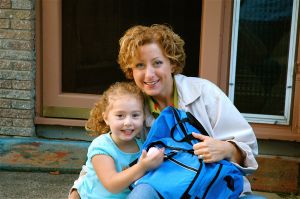
A week later I was summoned to meet with the school director. My suspicion was that they were kicking us out because he was just too much of a distraction to his pint-sized playmates. Instead, the director had convened all the pre-school teachers to discuss how we could turn the situation around and relieve his fears. The tips they gave me changed my son’s experience completely. The crying and fear didn’t go away immediately, but I was able to leave him with no tears (mine or his) by the second day.
Here are the things I learned that might help you on the first day of school:
- Fear of separation is normal for kids and most common times are around eight months, twelve months and anywhere between 18 months and three years, generally peaking around 12-24 months. Kids cry either because they are afraid you are leaving and will not return, or when they see you come back, because it reminds them of how they felt when you left.
- Fear of separation can change from day to day and from parent to parent. Don’t feel bad if you’re not the desired parent on a particular day
- Adults feel sadness and anxiety as well when separated from loved ones, but we have a better notion of time and can handle it better. This may help you understand your child’s fears.
- Many factors can worsen separation fears, including tiredness, illness, changes in household routine, or changes in caregiver at the school or daycare center.
- The first experiences with separation are important because they are foundations for building confidence for future separations.
Now some tips for those first days of school or daycare:
- Ideally, start occasionally using a babysitter after six months of age for short periods to build trust in adults. Playdates by 12 months, and eventually pre-school or daycare by age 3 or 4 can be helpful to prepare for the bigger challenges of kindergarten.
- Be supportive of your child’s feelings even if he cries and “acts like a baby.” Do not scold or make fun of him. Let the child know that you understand how scary it is to be separated from daddy without dwelling on the negative.
- When leaving, give a quick kiss, a goodbye, and promise that someone will be back to pick her up. Don’t sneak out of the room.
- Bring along things from home to remind the child of security. Recommended objects would be a stuffed animal that always goes to school and a photo of the family. Suggest to your child that he or she tell the teachers about the importance of these objects.
- Avoid communicating your fears and worries about your child. Always talk about school as a positive upbeat experience. Talk to teachers and learn the highlights of the day, and the names of the other kids so you can remind your child about the fun times he will have again.
- Continue morning and evening rituals. Avoid scary TV shows or talk that increases your child’s fears.
- Avoid the temptation to give in and skip school or cancel all together. If your child does stay home, do not make it an extra fun day.
Good luck. This is a hard step for your child and for you, but it’s a necessary part of teaching them to leave the nest.
Sources:
Northern County Psychiatric Associates
Recommended reading:
For kids:
- Don’t Forget to Come Back!
- We Laughed a Lot: My First Day of School
- You Go Away (Concept Books (Albert Whitman))
For you: